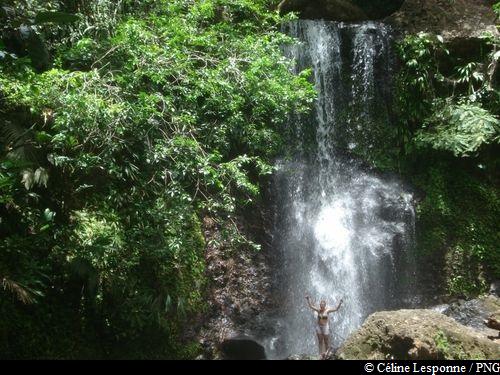
Sofaïa / Trois Cornes circular trail
7 points of interest
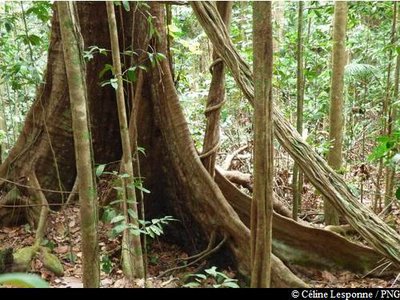
liane - Céline Lesponne / PNG  Flora
FloraCreeper plant
You can see a magnificent creeper plant not far from the path.
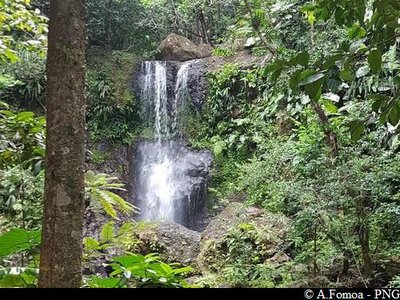
Saut des Trois Cornes - PNG  River and waterfall
River and waterfallSaut des Trois Cornes
Le Saut des Trois Cornes with its fine waterfall.
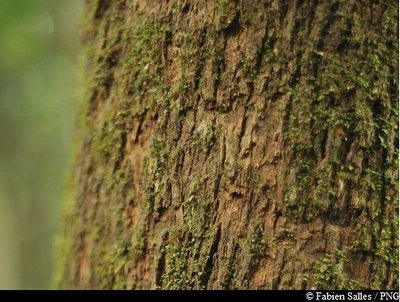
Marbri (détail écorce) - Fabien Salles / PNG  Flora
Flora"Bwa bandé"
Richeria grandis belongs to the Phyllanthaceae family. It is a large variety, distinctive for its tough leaves and reddish-brown bark that so often falls victim to rogue extraction. Also known as bwa bandé in Créole, it is renowned for its aphrodisiac qualities. Its wood is used as timber or in carpentry. It has very distinctive, green, grape-like fruits which form small pods and form copiously on its branches.
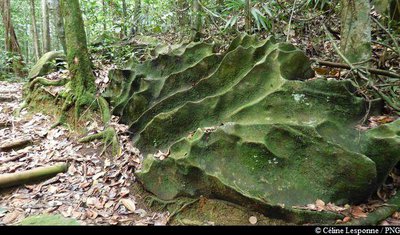
"Rocher du dragon" - Céline Lesponne / PNG  Geology
GeologyRock formations
Large rock formations with a distinctive shape. Water, the primary erosion agent, works mechanically on the rocks, producing a polishing effect.
A local mountaineering club has coined the term "The Dragon's Rock" to describe this rock.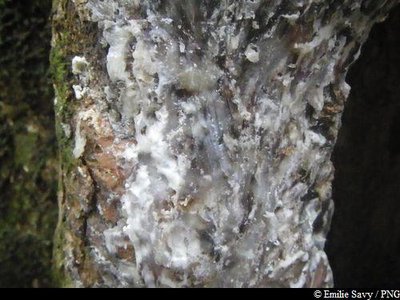
Gommier blanc (sève) - Emilie Savy / PNG  Flora
FloraThe Gommier
The Gommier (Daryodes excelsa) can grow up to 35m high. When they are damaged, its white trunk and roots exude a white resin with a pungent turpentine smell, which is traditionally used as incense or to start fires, because it burns slowly regardless of the surrounding humidity. It is reported that the tree has the ability to cast out spirits. It is strictly forbidden to take away any plant parts from the National Park. Its trunk was used by American Indians to make their canoes (kanawa), and is still used today by coastal people from many tropical countries, such as Dominique, to make fishing vessels. Its green seeds are popular with pigeons.
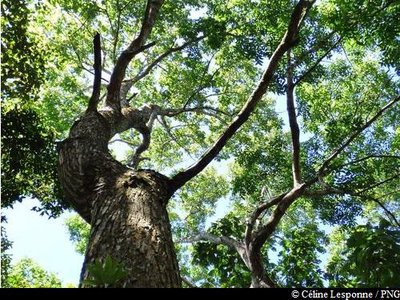
Mahogany Petites Feuilles - Céline Lesponne / PNG  Flora
FloraWest Indian Mahogany
The West Indian Mahogany (Swietenia mahagoni) is a robust species native to Ispagnola. This dry forest tree was initially planted as an ornamental feature for houses, but then spread elsewhere. Despite the wood being of extraordinary quality, it grew too slowly to be used in reforestation. When degraded forests needed to be revived and enriched, foresters turned to this tree for the task.
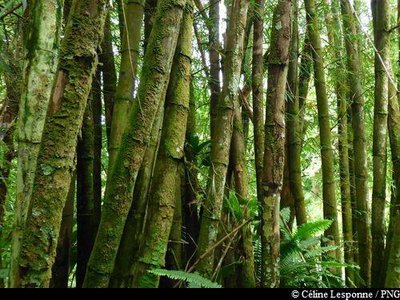
touffe de bambous - Céline Lesponne / PNG  Flora
FloraBamboo
A member of the Poaceae family, bamboo is more closely related to grasses than to trees. Made up of a woody, hollow stalk, its stem grows extremely quickly. It is both a highly resistant and invasive species in Guadeloupe and concerted efforts are being made to put it to best use in crafts and construction.
Description
Hiking trail colour: yellow
Take the route starting from the information board at the start of the hike, at the bottom of the parking area. The track goes downhill steadily through some impressive tropical forest trees. Once you reach the intersection (Point 1), keep going downhill until you emerge at the Moustique river. Cross it carefully and then keep going towards Saut des Trois Cornes. Enjoy the peace and quiet at this location before heading back. Go back to the intersection (Point 1) and head west to carry on with the rest of the circular trail. Follow the yellow markings. At the next intersection (Point 2), turn right. Go uphill steadily until you reach the crossroads (Point 3) [the trail joins up with the "Baillargent / Belle Hôtesse" and "Tête Allègre" trails].
Turn right at this intersection and then go down until you reach the site of Sofaïa. You then have the option to stop off and use the outdoor showers, located below the parking area. These showers use the hot and sulphurous waters of the Sofaïa.
- Departure : Site of the Sofaïa hot springs
- Arrival : Site of the Sofaïa hot springs
- Towns crossed : Sainte-Rose
Altimetric profile
Recommandations
This route is hazardous when it is raining. Do not plan a hike if it has been raining the day before or if bad weather is forecast. If water levels are rising, do not try to cross the river. Wait until they return to normal.
Extra care should be taken in this natural environment, as Guadeloupe is prone to natural risks. For the benefit of all hikers, responsible behaviour is requested.
Please note : the parking and swimming areas are not supervised.
Make sure you adhere to any rules issued by the Regional Health Agency concerning hot baths.
Information desks
Headquarters of the National Park of Guadeloupe
Montéran, 97120 Saint-Claude
The reception and shop are open to the public :
- Monday, Tuesday and Thursday : 8 am to 12.30 pm and 2 pm to 5 pm.
- Wednesday : from 8 am to 1 pm.
- Friday : 8 am to 12.30 pm.
Services : reception, shop, toilets, free parking. Building accessible to people with reduced mobility.
Localisation GPS : Lat: 16,01634 N - Lng: 61,70753 W.
Access and parking
GPS coordinates of the start point : Lat : 16,03459 N - Long : 61,6701 W.
At Sainte-Rose: in the town, take Route RD19 towards "Pont Canal / Sofaïa". Go uphill until "Sofaïa", go past the small chapel and visit the hot springs of the Sofaïa, at the end of the road.
Parking :
Source
Report a problem or an error
If you have found an error on this page or if you have noticed any problems during your hike, please report them to us here:

